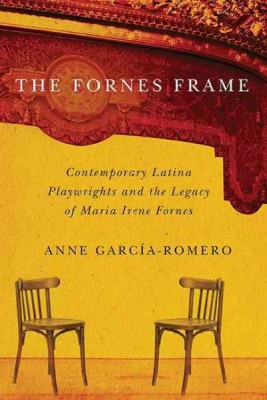| The Fornes Frame: Contemporary Latina Playwrights and the Legacy of Maria Irene Fornes First Edition, Edition Contributor(s): García-Romero, Anne (Author) |
|
 |
ISBN: 0816531447 ISBN-13: 9780816531448 Publisher: University of Arizona Press OUR PRICE: $23.70 Product Type: Paperback Published: March 2016 |
| Additional Information |
| BISAC Categories: - Literary Criticism | American - Hispanic American - Literary Criticism | Drama - Social Science | Ethnic Studies - Hispanic American Studies |
| Dewey: 812.609 |
| LCCN: 2015032996 |
| Physical Information: 0.7" H x 5.4" W x 8.4" (0.60 lbs) 256 pages |
| Themes: - Sex & Gender - Feminine - Ethnic Orientation - Hispanic |
| Descriptions, Reviews, Etc. |
| Publisher Description: A key way to view Latina plays today is through the foundational frame of playwright and teacher Maria Irene Fornes, who has trained a generation of theatre artists and transformed the field of American theatre. Fornes, author of Fefu and Her Friends and Sarita and a nine-time Obie Award winner, is known for her plays that traverse cultural, spiritual, and aesthetic borders. In The Fornes Frame: Contemporary Latina Playwrights and the Legacy of Maria Irene Fornes, Anne Garc a-Romero considers the work of five award-winning Latina playwrights in the early twenty-first century, offering her unique perspective as a theatre studies scholar who is also a professional playwright. The playwrights in this book include Pulitzer Prize-winner Quiara Alegr a Hudes; Obie Award-winner Caridad Svich; Karen Zacar as, resident playwright at Arena Stage in Washington, DC; Elaine Romero, member of the Goodman Theatre Playwrights Unit in Chicago, Illinois; and Cusi Cram, company member of the LAByrinth Theater Company in New York City. Using four key concepts--cultural multiplicity, supernatural intervention, Latina identity, and theatrical experimentation--Garc a-Romero shows how these playwrights expand past a consideration of a single culture toward broader, simultaneous connections to diverse cultures. The playwrights also experiment with the theatrical form as they redefine what a Latina play can be. Following Fornes's legacy, these playwrights continue to contest and complicate Latina theatre. |